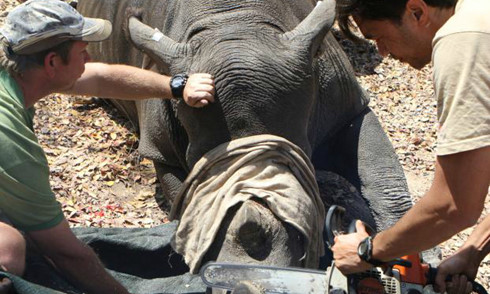Vietnam to beef up fight against illegal wildlife trade
The Prime Minister steps in, urging agencies concerned at all levels to combat the poaching and trafficking of wild animals.
 |
A white female rhino named Kuda is dehorned by the Animal and Wildlife Area Research and Rehabilitation (AWARE) at Lake Chivero Recreational Park in Norton, Zimbabwe August 25th, 2016. (Photo: Reuters/Philimon Bulawayo)
In what appears to be a response to the threat of trade sanctions for failing to clamp down on the illegal trade in rhino horns, Prime Minister Nguyen Xuan Phuc has called for prioritizing enforcement at all levels to combat the poaching and trafficking of wild animals in Vietnam.
The directive was released on September 17th; two days after the World Wildlife Fund (WWF) urged the Southeast Asian nation to resolutely act on the illegal trade of rhino horns.
Despite recent efforts by the government, wildlife specimens, such as elephant ivory and rhino horns, are still traded across the country, according to the directive.
The Prime Minister has asked the Ministry of Public Security, in collaboration with other government agencies, to coordinate investigations into trafficking syndicates and to prosecute those convicted of the sale and transport of rhino horns, ivory and other wildlife specimens. The crackdown will also look into online trading.
Local authorities have been directed to increase efforts to detect the illegal trade of wildlife. Checks should focus on traditional craft villages, souvenir shops located in tourist sites, airports and seaports and traditional medicine stores.
The Vietnam CITES Management Authority has been asked to increase information sharing and coordinate with investigations into illegal trafficking cases, while local media has been told to promote public awareness about wildlife protection.
CITES is the Convention on International Trade in Endangered Species of Wild Fauna and Flora.
In a statement released on September 15th, the WWF urged Vietnam to crank up its efforts to crack down on the illegal trade of rhino horns, adding that failure to do so could result in trade sanctions.
Vietnam’s failure to shut down illegal markets, disrupt trafficking networks and prosecute traffickers will top the agenda of the 17th Conference of the Parties (CoP17) to the CITES, which will open next week in Johannesburg, South Africa.
Despite widespread evidence of rhino horns openly for sale in Vietnam, authorities have made no significant rhino horn seizures within their borders and have reported no successful prosecutions, the WWF said.
International conservation groups have identified Vietnam and China as the world’s two main consumers of rhino horns, a charge the two countries have bristled at./.
( VNF/VOV )
Recommended
 National
National
Vietnam News Today (Jun. 5): PM sets off for attendance at UNOC 3 in France, official visits to Estonia, Sweden
 National
National
Vietnam News Today (Jun. 4): Vietnam - Promising Candidate for Southeast Asia’s Next Powerhouse
 National
National
Shangri-La Dialogue 22: Vietnam Highlights Some Issues of Ensuring Stability in a Competitive World
 National
National
Vietnam News Today (Jun. 3): PM Pham Minh Chinh to Attend UN Ocean Conference, Visit Estonia, Sweden
 National
National
Vietnam News Today (Jun. 2): Vietnamese Trade Mission Sounds Out Business Opportunities in United States
 National
National
Vietnam News Today (Jun. 1): Vietnamese, Japanese Firms Foster Partnership
 National
National
Vietnam News Today (May 31): Vietnam Strongly Supports Laos’s National Development
 National
National
